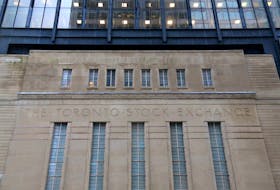Ticketing people for tinting their car windows isn’t always as transparent as it may seem, says a Halifax Black activist, educator and poet.
“That was one of the pretexts of the Kirk Johnson stop — overly tinted windows,” El Jones said when asked if race plays a role in the police practice.
In case you need a history lesson, Kirk Johnson is the North Preston boxer who won a human rights case against Halifax Regional Police in 2003 for a traffic stop six years previous. The inquiry found police pulled Johnson over because he is Black.

“That is one of the premises that African Nova Scotians well know has been used in traffic stops as a justification, much like the broken tail light or expired registration or other small procedural things,” Jones said.
“We’ve also seen overly tinted windows, which, of course, are generally associated with young Black men, being used as a pretext for stops. So, it’s not so much that African Nova Scotians may tint more, it’s that a narrative exists that they do. So therefore, if you’re stopping a car with tinted windows, you are likely stopping it because you anticipate that or understand that to be a car full of Black people.”
Last year a report from Toronto criminologist Scot Wortley concluded Black people were almost six times more likely to be street checked than whites in Halifax.
Jones doesn’t know if African Nova Scotians tint car windows more than anyone else. “That’s constantly been a stereotype that tinting is A) Black and B) Somewhat shady and criminal,” she said.
'Public surveillance'
The Chronicle Herald asked Jones if African Nova Scotians might tint car windows simply to avoid being pulled over frequently.
“Black people in public have no privacy,” she said. “You can’t walk down the street without being stopped. You can’t go in stores to shop. So, part of anti-blackness is this idea that the Black body becomes public property in a certain way and subject to public surveillance.”
This traces back to lantern laws in New York State, Jones said, “where it was illegal for Black people to walk around at night without shining a lantern. That was an early form of surveillance.”
Police surveillance -- “things like carding, street checks, traffic stops – are part of that ongoing and historical gaze always turned upon Black people,” she said.
“Black people search for privacy and autonomy in public continuously,” Jones said.
“So, it’s not hard to understand that Black people, therefore, when they’re driving and have to enter into public space might want a bit of privacy or a sense of protection.”
Cycle of stops
That self-protection is then read as a criminal measure, she said.
“People think Black people tint their windows because they must be up to no good,” Jones said. “And then it becomes associated with the idea that only drug dealers or pimps or whatever tint their windows, so therefore stopping a car with tinted windows is about criminal activity and not about Blackness. This is one way that we constantly see Black practices that we have to adopt just to live in this world then being stereotyped as negative in some particular way and then becoming a premise to criminalize us further.”
That’s why Black people talk about the cycle of police stops, she said.
“If you stop more Black people, you inevitably uncover things, and then that uncovering becomes proof,” Jones said. “So, you’re like every time we stop cars with tinted windows, in a large percentage of them we find contraband. So therefore, stopping cars with tinted windows is legitimate. But you’re only finding more because you’re stopping more. And that’s always been the cycle of the street check.”









